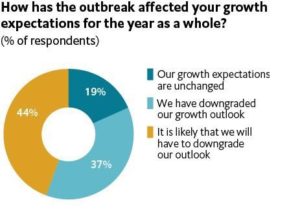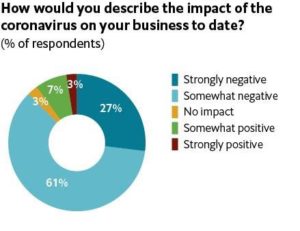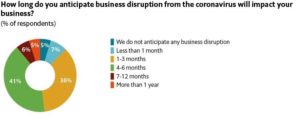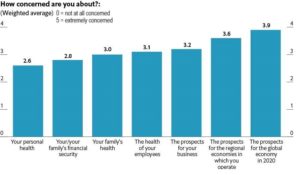MENA business leaders weigh growth, employment and health challenges in the face of COVID19

NB. Embargoed until 2am (Gulf Standard Time) on Monday 23 March 2020
More than 4 in 5 businesses in the region have downgraded (37%) or are expecting to downgrade (44%) their business growth expectations for 2020 because of the COVID19 pandemic (Fig 1, below).And many are reducing the size of their workforces as a result.
The Economist Corporate Network undertook a survey of senior business leaders in the Middle East: Coronavirus: implications for MENA businesses and their leaders, to discover how they are responding to the challenges posed by the new coronavirus.

The situation is highly uncertain for the regional business community, but there is a general consensus that COVID19 will have a negative impact on business: more than a quarter of respondents (27%) believe it will be strongly negative and a further 61% believe it will be “somewhat negative” (Fig 2).
Opinion is split on the likely duration of disruption to business from the coronavirus. Slightly more than half (52%) of respondents expect business disruption to last for more than 3 months, with a pessimistic 11% saying that it will continue beyond 6 months; while 43% of respondents believe the challenge to business will abate within 3 months (Fig 3).

The disruption caused by COVID19 is translating into a deferment of investment projects for 51% of respondents and a temporary suspension of parts of their business for 28%.
And this is coming at a cost to the staff of regional employers, many of whom face losing their jobs. Nearly a quarter (24%) of respondents say that their business is already making redundancies, and 20% say that it is enforcing unpaid leave as a result of business disruption caused by COVID19. Meanwhile almost 3 in 10 (28%) regional businesses are currently enforcing paid leave.
A reminder of the personal nature of the impact of COVID19 is provided by survey respondents’ answers to questions about their primary concerns (scores are out of 5: 0 = not at all concerned; 5 = extremely concerned). The survey shows that business leaders’ worries about their own health and financial security are real, but these are secondary to their concerns about the health of their employees and their families.
Regional business leaders are concerned about the prospects for their own organisations, but are even more worried about the future of the regional and global economies.
The Economist Intelligence Unit (The EIU, another division of The Economist Group) now believes that global growth will stand at 1% this year (from 2.3% before the outbreak started), as the pandemic affects both supply and demand and limits trade and travel.
GDP growth in the MENA region will be 0.8% (2.3%), with Saudi at 0.5% (1.7%) and the UAE at 1.2% (2.2%), with risk firmly on the further downside.
A sharp fall in global oil demand, coupled with tensions between Russia and Saudi Arabia, have prompted The EIU to revise its oil price forecast: it now believes that oil prices (Brent crude) will average US$45/barrel this year, and recover to US$53.8/b in 2021.

Robert Willock, Director MENA for the Economist Corporate Network, says: “The results of our exclusive survey of senior regional business leaders demonstrate the very real challenges being faced by companies in the Middle East as a result of COVID19. The vast majority are experiencing or expecting a slowdown in business performance, and many are having to make difficult decisions to mitigate that.
“While company revenues and profits, and GDP growth are all important measures of economic success in normal circumstances, perhaps the dashboard of indicators we should care about right now are health outcomes and support for key workers, as well as unemployment and income protection for families.
“Business leaders, who often have responsibility for the livelihoods of hundreds or thousands of staff, will be doing all they can to minimise the human cost of this pandemic, and will be grateful for any government-provided fiscal support on offer to help with that mission.”






